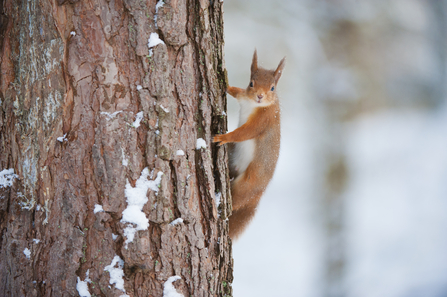
Red squirrel (Sciurus vulgaris) in pine forest, Glenfeshie, Scotland © Peter Cairns/2020VISION
Red Squirrel Recovery Network
What is the Red Squirrel Recovery Network?
It's an ambitious five-year project underway since 2023. It works at a super-landscape scale to bring about lasting change for red squirrels, who would be lost in 10 years without continuous and extensive conservation efforts.

Red squirrel © Mark Hamblin/2020VISION
We're at a critical point for the recovery of red squirrels across the UK.
Why do red squirrels matter?
Once common across the UK, red squirrels are now limited to isolated populations in the Northern England and Southern Scotland. Due to grey squirrel only areas now firmly established to the north and south of this area, and grey squirrel incursion occurring regularly, red squirrels in this region are extremely vulnerable to extinction.
Red squirrel numbers plummeted across the UK over the past century, because of loss of habitat, hunting and the introduction of grey squirrels by the Victorians. As well as competition for food and space, grey squirrels carry a pox which infects and kills reds. It’s a horrible death for one of our favourite creatures.
What have we achieved so far?
Together with our partners, we've already completed a one-year development phase of the project, gathering and collating vital data upon which the project is built. This has included collecting baseline data across the entire project area on squirrel distribution, grey squirrel management activities, and volunteer demographics.
This has allowed our red squirrel experts to draw up conservation plans, along with developing the methodology for future large-scale grey squirrel fertility control. Extensive communication and volunteer engagement plans have also been developed to help encourage new volunteers.
What will the Red Squirrel Recovery Network achieve?
The Red Squirrel Recovery Network aims to achieve a number of practical benefits for our endangered red squirrels:
-
Habitat improvement
Tree planting will help support red squirrels.
-
Grey squirrel fertility control
The sad truth is that without undertaking grey squirrel control, red squirrels would be extinct in the UK in under 10 years. However, this project sees us working on developing an effective methodology for the future deployment of grey squirrel fertility control and we'll be testing the delivery mechanism in 2028.
-
Secure future funding
We're working with current and new partners to secure a future for reds, and resilient woodlands and forests across Northern England and Southern Scotland. This includes working with partners and landowners to establish new income streams for red squirrel conservation.
-
Working together
Being part of the extensive Red Squirrel Recovery Network allows us to improve data sharing across the area to build a more coherent picture of the current state of our red squirrel populations and model the likely impact of new game-changing interventions.
Partners and funders
For the first time, the Red Squirrel Recovery Network brings together conservation partners and 50+ volunteer groups to work across the Southern Scotland/Northern England red squirrel range. The project links up partners, including and in no particular order:
- Northumberland Wildlife Trust
- Cumbria Wildlife Trust
- The Wildlife Trust for Lancashire, Manchester and North Merseyside
- Scottish charities Bright Green Nature and Galloway & Southern Ayrshire Biosphere partnership
- Merseyside-based Knowsley Safari Foundation and the UK Squirrel Accord.
This project has been made possible by the National Lottery Heritage Fund, with thanks to National Lottery players.




